|
FOLLOWING the
collapse of Harney's Friend of the People, the demise of which
was foreshadowed some time earlier, Massey had to concentrate his
activities on lecturing. Despite his advertised large prospectus
it is not certain just how successful he was in obtaining bookings for
the spring of 1853, and he may have been limited to provincial
mechanics' institutes and working men's associations. Harney again
made two attempts at a weekly paper. The Vanguard which he
commenced in January of that year survived for only three months, and
Massey made no signed contributions to it, although an article ‘The
Political Refugees’ may have been written by him. The Beacon,
from October 1853 to January 1854 proved equally unsuccessful, and again
there are no signed contributions by Massey.
In the spring or summer of 1853 the family moved probably to
cheaper but much smaller rooms in 12, New North Street, Red Lion Square
where Massey's second child, Cecilia Geraldine was born on the 4
October. Due to her pregnancy and following the birth of Cecilia,
Rosina had been unable to continue with her clairvoyant consultations,
and their finances became once more a cause for concern.
Fortunately Massey was able to obtain a post later that year as
book-keeper to the publisher John Chapman, probably taking over the
vacancy from a Mr Hogg, who had been employed at a salary of £120 per
annum.[1] Chapman rented out some of the rooms
in his large Strand house, of which one occupant from 1851 to October
1853 was George Eliot, and held Friday evening literary discussions with
persons notable in the scientific and literary fields. Improved
financial prospects induced the family to move again, this time to
better accommodation at 28, Henrietta Street, Brunswick Square.
After the limited success of Voices of
Freedom, Massey was encouraged to prepare a further volume of
verse, incorporating into it his earlier poems. By January 1854
Massey had completed his best known poem, the birth to early death
tragedy of ‘The Ballad of Babe
Christabel’; while an unconscious premonition of ensuing events, the
Ballad was not, however, inspired by the death of his daughter,
Christabel, who lived to a ripe old age (d. 1934):
|
...
It fell upon a merry May morn,
I' the perfect prime of that sweet time
When daisies whiten, woodbines climb,
The dear Babe Christabel was born...
O happy Husband! happy wife!
The rarest blessing Heaven drops down,
The sweetest blossom in Spring's crown,
Starts in the furrows of your life! ...
And thus they built their Castles brave
In fairy lands of gorgeous cloud;
They never saw a little white shroud,
Nor guess'd how flowers may mask the grave...
And still her cheek was pale as pearl,
It took no tint of Summer's wealth
Of colour, warmth, and wine of Health:
Ah! Death's hand whitely pressed the Girl!
... |
The Ballad of Babe Christabel: together with other Lyrical
Poems which included a portion of the 1851 biographical sketch by
Samuel Smiles, was paid for by Massey and published by David Bogue in
February 1854 after being submitted unsuccessfully to other publishers,
including John Chapman. The reviews followed quickly.
Hepworth Dixon, chief editor of the Athenæum journal casually
picked it out from a number of other items marked for review on his
desk, and noticed one particular poem that seemed to be familiar.
He remembered that two years earlier he had been browsing in a bookshop
in the Gray's Inn Road while sheltering from a rain shower, and had
looked through a bound edition of Harney's Red Republican.
Inside the dust-wrap cover, under the index, had been a poem 'The Song
of the Red Republican' by G. M. that had been published originally in
Cooper's Journal. Yes, this was certainly the author.
Dixon was going to spend the Sunday in Brighton with Douglas Jerrold,
former editor of the Shilling Magazine and contributor to
Punch, so he took the book to show him. Both men were
impressed with Massey's natural poetic ability. Dixon reviewed the
book in the Athenæum, in which he introduced Massey as a young
poet — and as something more:
A man whose ear - though not yet tuned to the complete and glorious
harmonies of our English tongue - is sensitive to rhythm . . . whose
imagination throws out images in sonorous words . . . so that sound and
image seem identical . . . He is a true poet, - but he has grievous
defects . . . he lacks culture. He requires taste. His ear is defective.
(Yet), our workman-poet has become a teacher to his class. He speaks to
them in passion - counsels, exhorts, inspires them with his own vehement
and vigorous spirit . . . many a line suggests - and many an image
vivifies - the idea of a vast social revolution as that which appears to
him the natural and inevitable path of issue into a better state.[2]
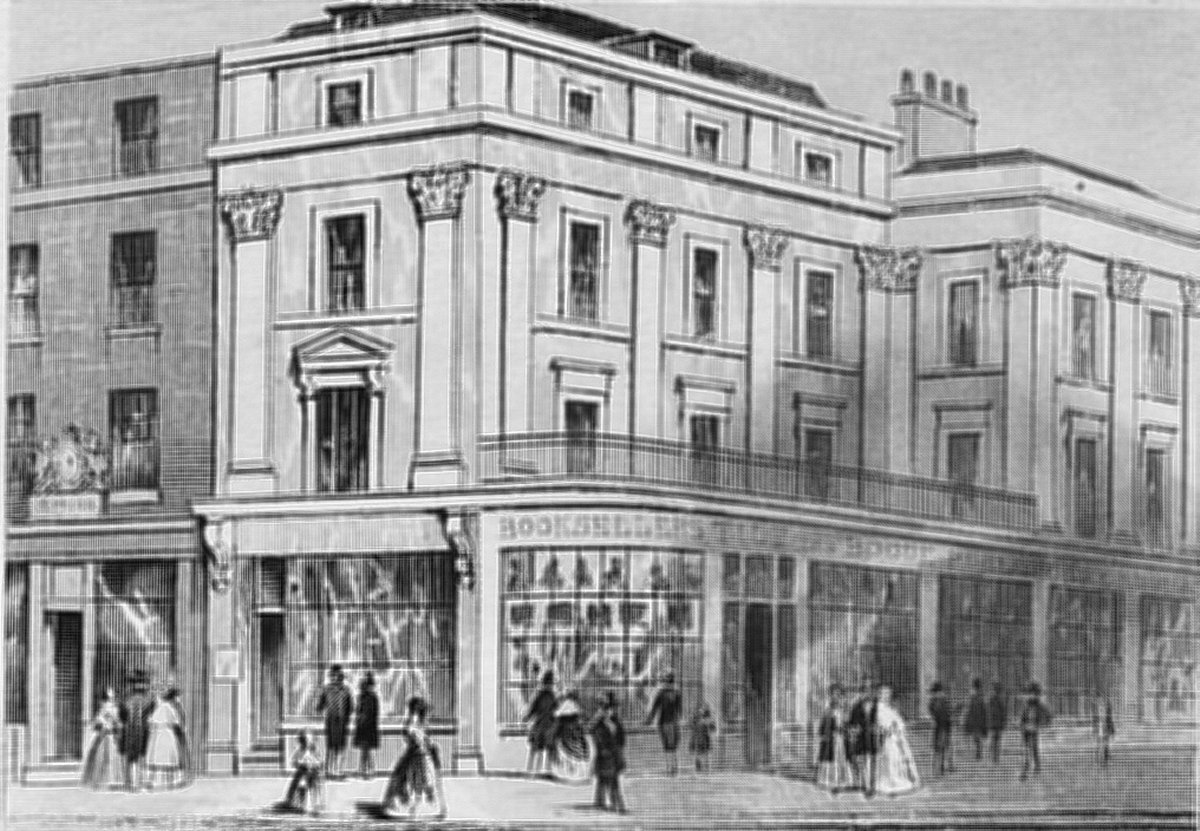
Charles Tilt's bookshop at the corner of 86 Fleet Street
and St. Bride's Lane
(Payne's Illustrated London, 1846-1847)
Became
Tilt & Bogue from 1841-3, then David Bogue to 1856. Massey had his
Ballad of Babe
Christabel, War Waits, and
Craigcrook Castle published
there.
Douglas Jerrold's review appeared the following day in
Lloyd's Weekly, referring to 'Babe Christabel' as wholly a thing of
beauty.[3] Walter Savage Landor's comments in a
review letter to the Morning Advertiser mentioned some faulty
metre and the use of substantives as verbs (e.g. 'rainbowed'), but
considered, together with other praise, that 'Massey has given us
thoughts and expressions which remind us of Shakespeare in the best of
his sonnets.' [4] Favourable reviews in most of
the main newspapers and journals and especially by these three
influential literary personages gave a major impetus to sales. A
second edition was produced in March, following which the third was
brought out in June (published in America as
Poems and Ballads), the
fourth in November and the fifth the following February, 1855.
Although selling five thousand copies, the author's final proceeds
amounted to only fifty pounds, the book having to be re-set for each
edition.
But amid the praise, there was one non-committal review and
one that was distinctly adverse. The Westminster Review
wished that Massey would subject himself to a rigorous course of study
and self-culture, before venturing into print again.[5]
However, G. H. Lewes, in the Leader, went further by referring to
‘Admiration pushed to absurdity by the Athenæum’, declaring that:
Gerald Massey has a prodigal command of words, a faculty of poetic
expression, and a certain spontaneity of song, which may hereafter
develop into poetry worthy to be called by the name. He wants some
of the characteristic qualities of a poet — taste and good sense, for
example …[6]
The following week a more caustic extension was added:
Our readers must have been somewhat amazed — as we ourselves were —
last week by the chaotic article on Modern Poets, wherein, among
other incongruities, we were made to praise, with all the emphasis of
italics, some of Gerald Massey's lines emphasised for special
disapprobation … By an accident at the printer's … we had our proof
‘shorn of its fair proportions’ … after quoting liberally and
approvingly specimens of the really good writing in Gerald Massey's
volume, we had, in all fairness, to point out some of the defects; the
passage in which this was done was dropped out by accident, and we now
restore it from a copy of our proof … [7]
Lewes complained and gave examples of ‘fantastic tricks
played with the English Language’, and of ‘the tawdry splendour of fine
phrases’. He quoted one passage which contained ‘vices and
affectations’, which was marked by Massey's liking for contracted words
at that time. ‘Heaven'd’, ‘region'd’, ‘jewell'd’ and ‘swirl'd’,
may have been influenced by Landor's enthusiasm for the fidelity of
spoken sound.[8] Lewes concluded his censure
with:
The passage thus restored may explain the verdict which on summing up
we had to pronounce upon the writer, but which must have seemed to the
reader unjustified by the specimens given, the more so as we appeared to
praise the affectations no less than the beauties. (N.B. Since the
foregoing was in type we have received a letter from Mr. Massey, which
proves — if proof were needed — that the want of good sense and taste we
noticed in his poems extends to his letters.)
The letter Lewes referred to was mentioned in a communication
from George Eliot to Sara Hennell, written on the 9th March:
Mr. Lewes has just come in and put into my hands the enclosed letter
from Gerald Massey, which shew Mr. Bray.[9] Be
it noted, that the 'letter' G. Massey refers to contained the question
when was Mr. L. going to review G.M.'s book, as he (G.M.) meant to
advertise in the Leader. Also, that Mr. Lewes has been very
kind to Gerald Massey as an author …[10]
One may speculate that if Massey had not written so
impetuously, the review might have continued in moderately critical
vein, without the more caustic comments presented the following week.
A few days later, on 15 March, George Eliot wrote in a letter to Charles
Bray, ‘… I thought it right to let you know the worst side of Gerald
Massey,[11] for his sake as well as yours, for
Athenæums and Savage Landors can only lead to perdition.
Otherwise I should be sorry to expose a ‘fellow sinner.’[12]
Charles Bray had met previously with the Masseys at his home in St.
James', in January 1853. In his autobiography he mentions:
We had Mr & Mrs Gerald Massey staying with us. She exhibited in
public professing to be able to read without her eyes. Her eyes
were carefully tied over, or you were allowed to put your hands over her
face, but I noticed that she could not read until the bandage was
considerably displaced, and she was obliged to go to the light, and if
when you held her eyes, you did it effectually, she always complained
that you hurt her till you gave her more space. My opinion in this
case was that there was no more than an exaltation of the natural sense
of sight, which enabled her to see under conditions which she could not
do in her ordinary natural state.[13]
W. E. Adams also mentions a
case of mesmerism and blindfold reading which he saw probably in the
early 1850s. A girl of about his age had her eyes held by Adams
while he produced a book from his pocket which she had never seen.
At a random page she was able to read well, though Adams was quite sure
that she could not possibly see at all.[14]
It has been attributed by various sources that Gerald Massey
was the 'natural' for George Eliot's Felix Holt, the Radical.
This was presented in J. Churton Collins' Studies in Poetry and
Criticism, 1905, in Sir Sidney Lee's portrait of Massey in the
Dictionary of National Biography, 1912, and in later publications.
The earliest reference I can trace is in the American Banner of Light
of 1 December 1883. It states, ‘Friends of Marian Evans (George
Eliot) have heard her say that she had the character and career of
Massey in mind when she portrayed her Felix Holt, the Radical.’
Alfred Miles' Poets and Poetry of the Century, 1897, then repeats
the statement. Unfortunately no source is given for any of this
information, and it is difficult to attribute to Massey either the
physical characteristics of Felix Holt, with his mild radicalism, and
with only slight interest in political causes.
Holyoake defined Felix Holt as a positivist,
and one who fulfilled George Eliot's idea as to the radical which ought
to be.[15] It is known that Eliot studied
various works preparatory to writing Felix Holt, which probably included
Samuel Bamford's
Passages in the life of a
Radical, 1844, as well as using for her portrayals
characteristics of persons she met while staying at Chapman's house.
Although she probably met Massey casually at that time, it is unlikely
that they had any form of acquaintanceship, despite Eliot in 1868 asking
her publisher to send Massey a copy of her Spanish Gypsy.
Gordon Haight is unable to explain her reason for this, and there are
none of Massey's books listed in the Eliot-Lewes library catalogue.[16]
At that time Massey was secretary to the Society of the
Friends of Italy. Formed to promote more popular sympathy in England and
to influence foreign policy by propaganda towards its democratic cause
as promoted by Mazzini, the society had many persons of literary
influence on its committee. Douglas Jerrold, Walter Savage Landor, W. J.
Linton, George Jacob Holyoake and G. H. Lewes were active supporters,
which helped to make Massey's name more widely known.[17]
Massey sent copies of his book to friends and literary
persons, including Louis Kossuth, Thomas Carlyle, John Ruskin and Alfred
Tennyson. This was a common practice among new authors, who were
able to edit any favourable response for inclusion in later editions or
future works. Kossuth commented, ‘Thanks, many thanks for your
gift, which I value very much indeed. It will do good to my
chilled heart, to warm at the fire of your genius …’[18]
The cynical Thomas Carlyle wrote to thank him, and added:
I wish I could do anything to help towards maturity and real
usefulness such a talent as yours … it is to your own truthfulness …
piety and loyalty of mind, that we must look for a solution of that
problem; help is not elsewhere,—else—in various forms, is hindrance
mainly!
I have not anything to say on these sorrowful times through which we are
now passing. To my mind the greatest fountain of them all is
(little as we yet suspect it) precisely excess of ‘saying’ and talking
and palavering,—which the English Nation, for a great while past, has
grown to consider as the chief function of man, and the substitute for
silent hard work in all kinds. I believe the cure of
Balaclava,—and of the universal ‘Balaclava’, which that small Crimean
one is but a symbol of,—lies far beyond the dominion of speech: at any
rate my sad ominous thoughts upon it are better to be kept silent than
spoken, if they were even speakable …19
Ruskin respected Massey's genius, but thought he was ‘too hot
a socialist’.[20] Tennyson referred to Massey's
‘captivating volume’, and although ‘you make our good old English tongue
crack & sweat for it occasionally . . . Time will chasten all that.’[21]
The author and journalist Eliza Linton received a copy, and
wrote an enthusiastic acknowledgement referring also to Landor's
continued interest in Massey following his earlier review in the
Morning Advertiser:
I was with dear Mr. Landor not long ago, and you have quite a warm
niche in that brave noble heart of his. He seems to have a
fatherly love for you, and to be proud of your success … I wasted
not one but many tears over the sweet Babe Christabel … I could
scarcely have believed that a man could have written it … If you
have been praised by the Athenæum, you have muzzled the great Cerberus
of all, have you not? … Why has the Leader flown at your throat?
I thought you were a great pet of theirs—for I have heard you spoken of
by me of them at least very affectionately and I was surprised at the
onslaught, and pained too. I hope Mrs. Massey is better, and that
all will be bright and golden with you …[22]
The following letter was written by Massey to Samuel Smiles,
former editor of the Leeds Times, whose article in Eliza
Cooke's Journal encouraged Massey to continue as a ‘people's poet’
following the publication of Voices of
Freedom. Smiles at that time was contemplating commencing
a newspaper in London, but later decided against the idea.
28, Henrietta St.,
Brunswick Square.
My dear Sir,
I have just sent off the small parcel of my books including one in Cloth
which I hope you will accept from me. The Review in the
Athenæum has given a strong impetus to the sale, but I shall not be
able to take advantage of the tide of success for want of means to
advertise. I was somewhat surprised to hear what you had in
contemplation. The establishment of a Cheap Newspaper is a
formidable affair. I had a taste of that some time ago. A
friend of mine bought O'Connor's Star and started the Star of
Freedom of which I was one of the Editors. He spent 700 or 800£
and it failed.[23] To be sure, there
were many reasons for the failure. It was damned already in public
opinion, and the old partisans had dwindled down to a thousand
subscribers. At the same time Ernest Jones started his Paper and
we were beaten, as we considered it better to give up than to exist on
such terms as he did. And then again, Harney is used up and worn
out; he never was anything more than one of the barnacles that stuck to
O'Connor.[24] I wrote the reviews and
most of the leading articles in addition to compiling a portion of the
news. I still think there is room for a paper if it could be made
well known, and I should like to have a hand in the undertaking. I
suppose I shall drift into Journalism like others, by force of
circumstances; very few persons I think would do it from choice.
Just now I am doing nothing saving a weekly letter to the New York
Tribune, and am greatly in want of something. I hope if you
should come to London to start a paper, you will not complete your
arrangements without remembering me. I have not been at Chapman's
for some time past. I found my engagement there only a mere stop
gap. I must either get something soon or emigrate, for we have
spent the last 2 years in miserable plight.
I am dear Sir,
Yours truly,
Gerald Massey.[25]
Chapman had moved from the Strand to Blandford Square in May,
and this was probably when Massey left the firm.
The third edition of Babe Christabel published in April
contained a preface in which Massey explained why he had included his
political pieces, for which he had been considerably censured.
Although many people still held those views which he had so forcibly
expressed, his opinions had changed to a less radical though still
strongly socialistic direction. At the time those rebellious
feelings were quite natural, and were his deliverance from what he
termed ‘a fatal slough’:
For the slave, degradation and moral death are certain; but for the
rebel there is always a chance of becoming conqueror; and the force to
resist is far better than the faculty to succumb … My experience tells
me that Poverty is inimical to the development of Humanity's noblest
attributes. Poverty is a never ceasing struggle for the means of
living, and it makes one hard and selfish. To be sure, noble lives
have been wrought out in the sternest poverty. But they were so in
spite of their poverty, not because of it …
The fourth edition of Babe Christabel (1855) had one
long and quite perceptive review, which noted Massey's originality of
imagery and description resolving themselves into epithets of
colour—unusual in a lyrical poet. Certain lines suggestive of
plagiarism were mentioned, but the good-hearted reviewer thought they
might be unconscious reminiscences of other poets or, used openly as
common property, due to their intrinsic excellence. But
disintegration of metre was condemned, and it was hoped that the author
would never again attempt blank verse, the reviewer preferring to
‘listen to Mother Hubbard's dog playing on the fiddle’.[26]
Because of Massey's immediate popularity and his biographical
sketch, John Blackwood of Blackwood's Magazine had approached him
regarding the possibility of writing about his personal experiences
within a socio-political framework. Massey replied, asking for
further suggestions. Unfortunately for period history, this
autobiography was later commenced but never completed:
28 Henrietta St.,
Brunswick Sq.,
London.
Dear Sir,
I pray you accept my best thanks for your very kind note to me, and for
the friendly suggestion it contained. I have long had thoughts of
attempting such a work as you mention but have distrusted my limited
experience and my powers of transmuting that experience into a Book.
Again, I have been somewhat deterred by ‘Alton Locke’ which contained a
great deal of my experience, admirably rendered. So much so that I
should fear the charge of plagiarism were I to claim my own. I
should certainly have an advantage over Mr. Kingsley in having lived my
life, whereas he only sympathised with it. I have had a little
experience in writing prose, but, only in the shape of Newspaper
Articles. As regards my present opinions on Society, Religion, and
Politics—it would just take a Book to work them out in, therefore, I
cannot pretend to give you them in a letter. Suffice it to say
that I have passed thro' various phases and vast changes during the last
few years and I am still striving upwards and caring less for mysteries
as I get nearer to the heart of things.
When I have been thinking of writing a Book I have generally concluded
that it should be an Autobiography—can you give me any advice on this
point? My chief points or heads for my subject would consist of
Childhood among the Poor—life in a Factory—Character among the people
and the effect of Circumstances on its development—Village heroes—the
Calvinists among whom I was brought up—coming to London—Life as Errand
Boy,—as Draper—as Secretary of a Co-operative Association—Lecturer and
Litterateur—Courtship—Marriage—Children—these with my internal
revolutions—passions—mental developments—and especial ‘goes on’ at the
Mill and Manchester Men—and that Beast Reynolds[27]
whose ‘mysteries’ have such a pernicious effect on the ignorant poor and
a dash of ‘Clairvoyance’ of the existence of which I have greater proofs
than most men as my Wife possesses the faculty prominently.
This would be my main material. Think you it would do? I shall be
glad to hear your opinion. I have thought of killing my 'hero' at the
commencement and editing his MSS which would permit me to maintain my
present standpoint in surveying my past. I cannot possibly tell what
should constitute a specimen by which you could judge? And how do
you mean to help me toward publishing it were it to suit you? Will
you be good enough to present the Author of ‘Fermilion’ with a Copy of
my Book which I will send per post? Excuse my troubling you at
this Length and believe me Dear Sir
Yours Respectfully
Gerald Massey.
P.S. I forgot to mention that I should give a version of the Chartist
affair of '48 with some sketches of ‘Patriots’ whom I have met.[28]
The reference to ‘Fermilion’ was a satirical review article
written by William Edmondstoune Aytoun, Professor of Literature at
Edinburgh University, in which he criticised Fermilian: or the
Student of Badajoz. A Spasmodic Tragedy by T. Percy Jones.[29]
This 'T. Percy Jones' was himself, and he had not yet written the book
he was criticising![30] His censure was against
what he termed the ‘Spasmodic School’, poets of which were noted for
extravagant expressions of sentiment and mysticism emphasised in varying
quality of style. This was directed particularly against Sydney
Dobell, whose epic poem Balder. Part the First was the subject of
a favourable review article by Massey.[31]
Aytoun had stated also: ‘When one of our young poetical aspirants, on
the strength of a trashy duodecimo filled with unintelligible ravings,
asserts his claim to be considered as a prophet and teacher, it is
beyond the power of humanity to check the intolerable tickling of the
midriff.’ Massey and some of his friends questioned if this
sentence referred to his first edition of Babe Christabel, as
this was published in duodecimo size. His letter to Aytoun, sent
via Blackwood in 1854 for forwarding read:
Sir,
As one of the Readers of your glorious article—‘Fermilion a Tragedy’—and
as one that enjoyed it with immense gusto, permit me to thank you for
it; and at the same time to mention that some very kind and attentive
friends have construed some of your words into a notice of my Book.
You speak of a ‘trashy duodecimo’ & my own guilty conscience tells me I
have said many foolish things and thereby lends countenance to the
statement of the aforementioned friends. In case it was intended for me,
I beg to ask you to read the preface of my 3rd. Edition, a Copy of
which has been sent to you, and you will see that I do not claim the
title of ‘Prophet & Teacher’. I never said such a thing, never thought
of such a thing. If such words have been spoken of me, I am not to
be responsible for all the foolish things said whether uttered by the
Revd. Gorgeous Gilfillan or the Athenæum.[32]
Excuse me for troubling you, and I trust you will not attribute to me
the object attributed to Apollodorus[33] in
writing to the ‘Great ones in the land’.
I am dear Sir
Respectfully
Yours Gerald Massey[34]
Although there is no record of Massey sending a copy of his
book to Walt Whitman, a note written by him showed that he had received
a copy and made comments:
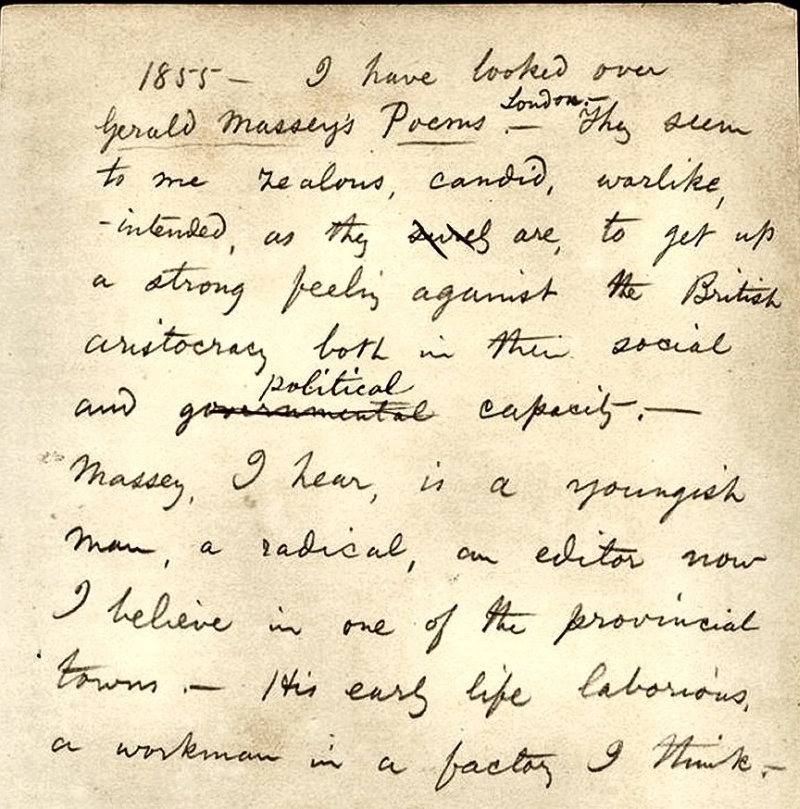
|
"1855
– I have looked over Gerald Massey’s Poems - London.
- They seem to me zealous, candid, warlike, - intended, as
they surely are, to get up a strong feeling against
the British aristocracy both in their social and
governmental political capacity.
―
Massey, I hear, is a youngish man, a radical, an editor now
I believe in one of the provincial towns.
―
His early life laborious, a workman in a factory I think."
Walt Whitman, Note on Gerald Massey, 1855,Trent Collection
of Whitmaniana, David. M. Rubenstein Rare Book & Manuscript
Library, Duke University. |
|
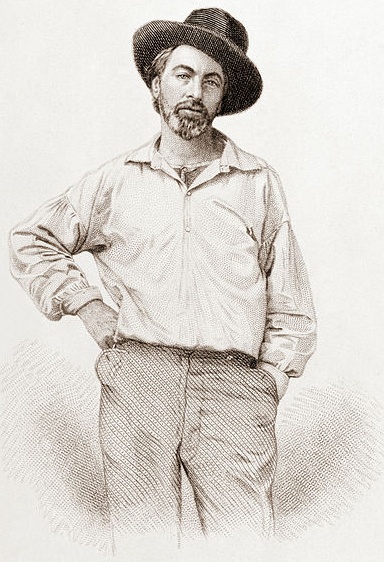 |
|
Walt Whitman in 1854.
A steel engraving by Samuel Hollyer
from a lost daguerreotype by Gabriel Harrison. |
The
"provincial town" to which Whitman refers, is Edinburgh.
During Massey’s later
tours of America he had not made contact with Whitman. However, in an
article 'New Englanders and the Old
Home' he made a brief reference to Whitman and to Charles Dickens'
Hon. Elijah Pogram. (Quarterly Review, vol. 115, Jan. 1864,
42-68.) Dickens’ Life and Adventures of Martin Chuzzlewit
written in 1843-44 following his visit to America in 1842, had referred
to the Americans as brash, vulgar and boastful. Epithets that caused
considerable irritation in that country.
Following the publication of Babe Christabel, Massey
concentrated on making literary contacts and had little time for
writing, apart from a poem and an article ‘Mazzini
and Italy’ for the Northern Tribune. His wife, Rosina,
was in poor health while expecting their third child, and they made yet
another move, from Brunswick Square to 14, Oak Villas, Oak Village,
Kentish Town. Since his review of Sydney Dobell's Balder he
had continued with friendly communications with this author, who wrote
to him from Edinburgh on 17 August:
|
My dear Massey,
My Wife is I believe about to write a word of sympathy on the subject of
yr Invalide & her expected trouble & I will only say therefore—what,
after all, sums up the whole that can be said—God help her—& you …
[35]
|
Exactly what trouble Rosina was having at that time is not
recorded, but it was probably a depressive precursor of greater health
problems to which the family would be subjected during the following
years. Marian Mertia was born one week later on 24 August 1854.
The fifth revised and enlarged edition of Babe Christabel,
published in February 1855, was dedicated to Lady Marian Alford ‘as a
small memento of respect and gratitude’. Hepworth Dixon, chief
editor of the Athenæum was friendly with Lady Marian Alford,
widowed daughter of the second Marquess of Northampton.[36]
Her son, John William Spencer, was the second Earl Brownlow. Dixon
had mentioned Babe Christabel to them and given them details of
Massey's background together with a summary of the family's present
circumstances. Lady Alford was considerably impressed, also by the
fact that Massey's birthplace was near to Ashridge. This prompted
her patronage, in which she either paid for publication of that edition,
or gave Massey financial assistance. In addition to the
dedication, Massey named his third daughter Marian after her.
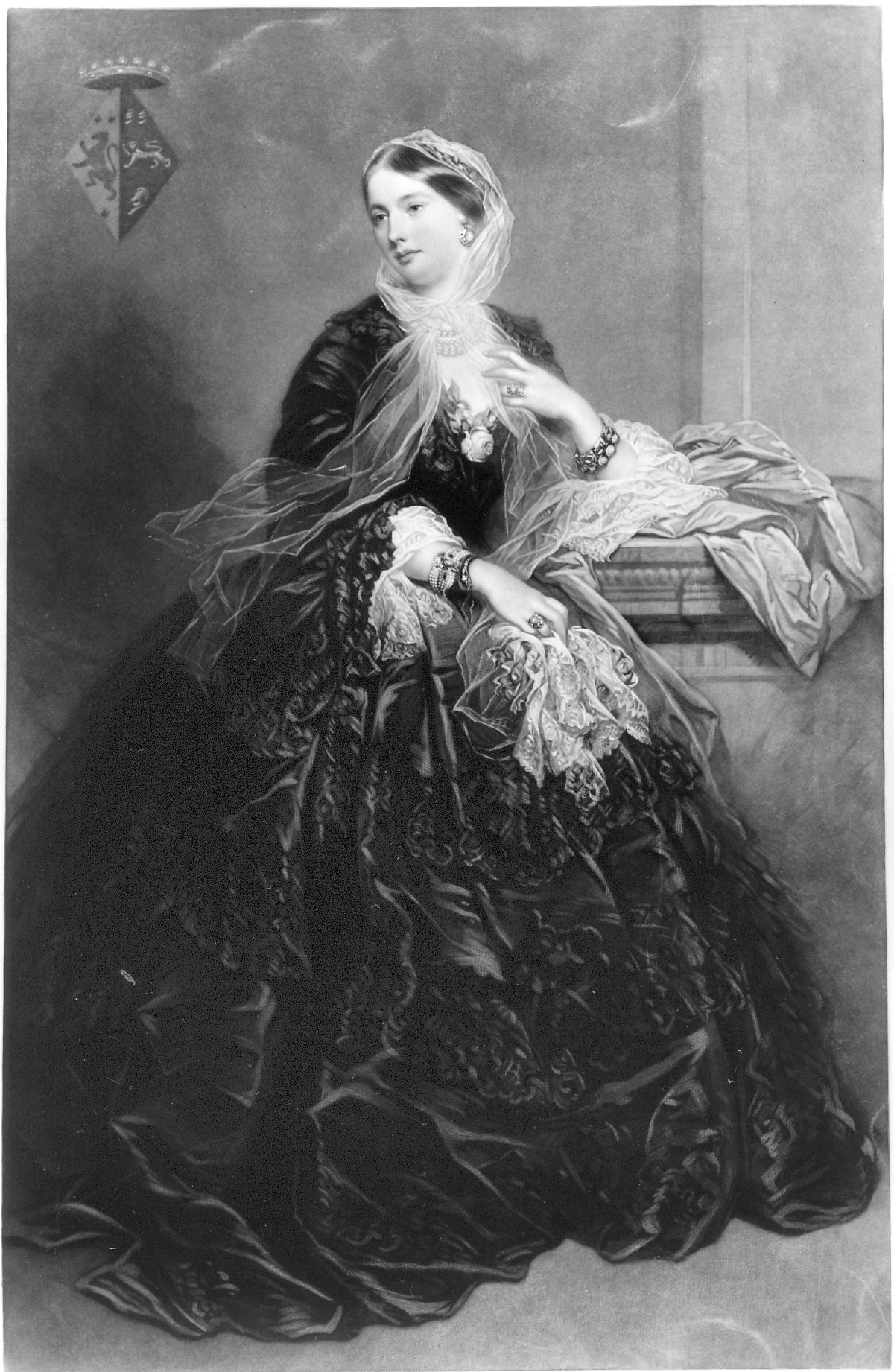
Lady Marian Alford, from an oil-painting
(Trustees of the British Museum).
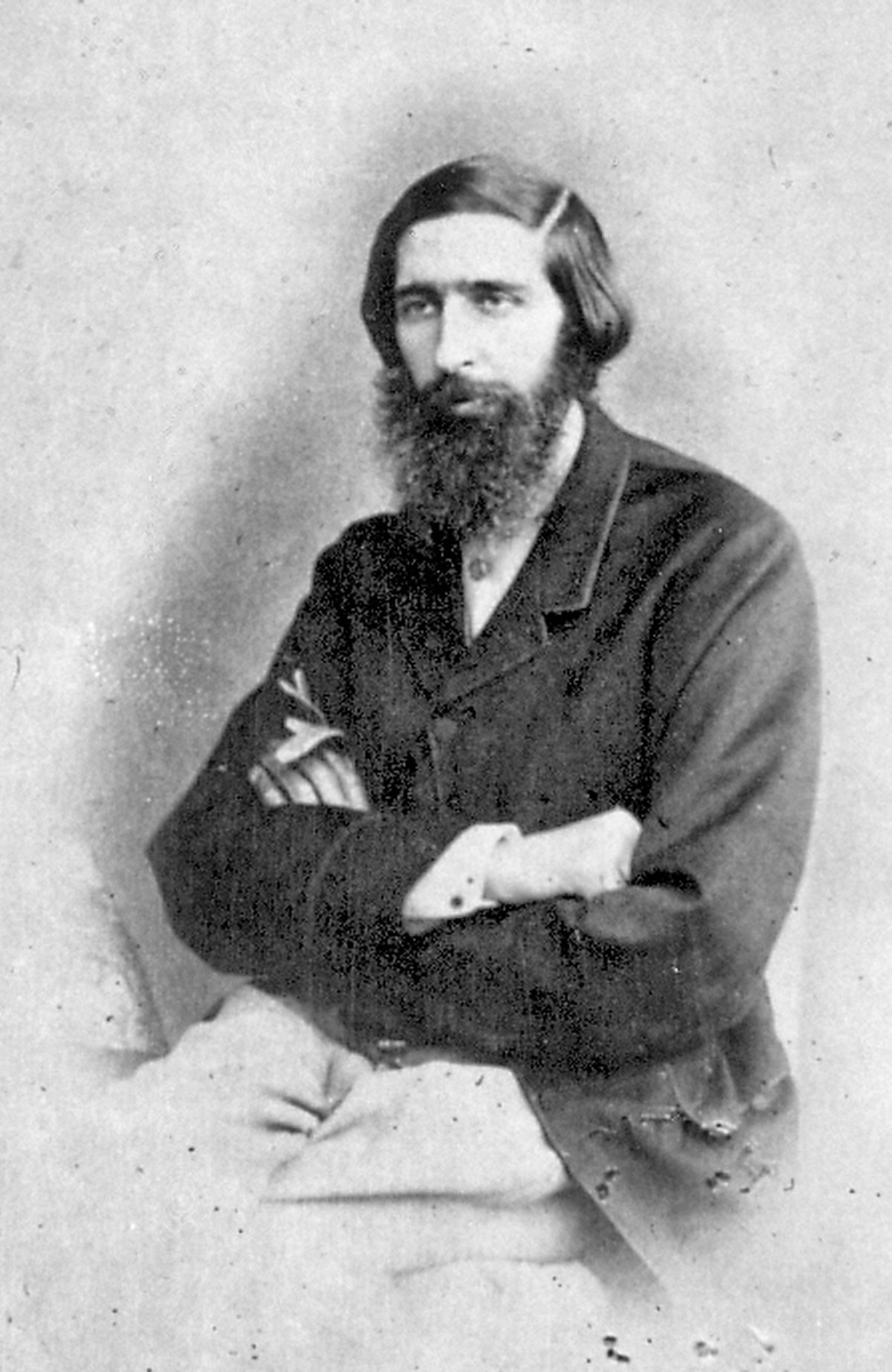
John William Spencer, Earl Brownlow
In Massey's 'In Memoriam'. (British Library copy only).
Not having been able to obtain permanent employment since he
left Chapman, his financial state was becoming quite critical. He
had managed to remain solvent that year, 1855, by contracting some
unsigned biographical sketches for Bogue's Men of the Time, for
which he wrote for personal information to Sydney Dobell (for Alexander
Smith the poet), Louis Blanc, and Ferdinand Freiligrath the German poet
and Communist. Also that same year Bogue published his Crimean war
poems, War Waits, dedicated to
John Bright, the anti-Corn Law campaigner and noted orator against the
Crimean war. Despite Massey referring to these poems as ‘rough and
ready war-rhymes’, the reviews were quite approving. The
Edinburgh News mentioned their 'beauty of expression and imagery',
and wrote in general terms of the author's 'nervous, vivid and
impassioned' style. The Athenæum again praised his
descriptive power: 'After verses so vigorous that it seems to echo the
tramp of horses and the roar of cannon, most of our minor minstrels
would be tame . . .'[37] It then added a shrewd
comment, ‘The charge, the contest, the retreat are vividly drawn by the
writer, who has never seen a squadron in the field.’ Sydney
Dobell, attracted to Massey since the Balder review, wrote to the
Rev. R. Glover:
I enclose you Gerald Massey's ‘War Waits’, and know how heartily you
will respond to their fine flushing enthusiasm. . . If you don't know
his other works yet, by all means lose no time in seeing them, and in
reading his Preface, which contains sentences of prose which Milton
might have written …[38]
Those literary works were financially unrewarding.
However, by March, Massey had obtained the promise of a post as an
editor on the Edinburgh News, due probably to some assistance
from Dobell who may have been the reviewer of War Waits.
Rosina was now expecting their fourth child. Massey wrote to
Harney on the 21 March, whom he had been expecting to meet during the
family's journey to Edinburgh:
It's all up about our coming to Newcastle. I find that we go
straight on to Edinburgh in one night and in less time than it will take
to go to Newcastle. Mrs. Massey is already knocked up and very
poorly and thinks we had better go direct … We shall be in a precious
fix in moving and this plan will obviate the necessity of our all
sleeping in London after the goods are moved and packed up in a ten feet
room …[39]
Just before moving he had time to write to
James Macfarlan, the Glasgow
‘Pedlar-poet’ who had sent him a copy of one of his volumes of poems:
Dear Sir,
I have received your pleasant little Vol and your kind letter.
Many thanks for both. There is one thing in your lines I protest
against; it is, calling Fame ‘'fickle’. Notoriety maybe; but true
Fame is fame for ever. But, Fame—grand lady as she is—can
never be a true Poet's Mistress, he cannot worship her, she is only
hand-maiden to his Beloved.
If you are a Poet, be sure Fame will find it out. There is no need
for haste, the Spring will come, the rose will blow, the Poet will be
recognised for what he is.
I am in expectation of seeing auld Scotland in a few days—I go to
Edinburgh —how far is that from Glasgow?
Macfarlan's friend J. P. Crawford had scribbled on the
letter: ‘Sold to me by Macfarlan for a 6d to Buy drink no doubt’.[40]
The family arrived in Edinburgh at the end of March 1855,
where they stayed in temporary accommodation at 14 Trinity Crescent,
which had been found for them by Dobell:
And first of the [Massey]s, who arrived in Edinburgh eight days ago,
and on Monday entered upon the lodgings we had found for them at
Trinity—where they now seem comfortably settled.
I have seen them every day, and am pleased to the heart to find in him
more even than I allowed myself to expect of beautiful and good ... The
upper part of his face reminds me of Raphael's angels, and I catch
myself dwelling upon him with a kind of optical fondness, as one looks
upon a beautiful picture or a rare colour. And this in spite of a blue
satin waistcoat! and a gold-coloured tie! The second morning I came upon
him early, sans neckerchief or collar, nursing his sickly baby, the grey
wrapper in which he sat, being like the mist to the morning as regards
his wonderful complexion, and it would be difficult to imagine more
marvellous (masculine) beauty …[41]
Massey was not due to take up his post with the Edinburgh
News for another two months, so he busied himself then and later by
writing some
articles for Hogg's Instructor, which also formed the basis for
two of his future lecture subjects. In ‘Thomas
Hood, Poet and Punster’, Hood's ‘Song
of the Shirt’ received honourable mention, continuing Massey's
commitment to the opposition of social injustice at that time. He
referred to it as a ‘piercing cry’ that:
woke up the wealthy and the great from their luxurious beds … that
showed them the human lives they were wearing out - the blood of little
children wrung out to dye their costly crimson … their sisters who
stitched their lives into their work for 4½d. per day … some,
indeed, cursed the voice of the poet that had so rudely broken their
voluptuous dream and they slunk back to their silken pillows. But the
rest stared on, and could not turn away... None but the poor know what
the poor endure. But this song led England to see that there were, in
London alone, 33,500 poor women, working for from 2½d. to 5d. per day
… [42]
|
…O! Men, with Sisters dear!
O! Men with Mothers and Wives!
It is not linen you're wearing out,
But human creatures' lives!
Stitch - stitch - stitch,
In poverty, hunger and dirt,
Sewing at once with a double thread,
A Shroud as well as a Shirt …[43] |
‘The Poetry of Alfred
Tennyson’, an appreciation of Tennyson's Poems, The Princess,
and In Memoriam, was probably the best article he had written on
a living poet up to that time, and was one of the first articles to show
his development of prose style when divorced from political commentary:
It is his colossal calmness, the absence of blind hurry, that is
often mistaken for a want of passionate earnestness … The poetry of
Alfred Tennyson constitutes a world of exceeding loveliness, a world of
peculiar beauty, unique in all literature … When his verse 'trembles and
sparkles as with ecstasy', it is intellectual, and not a dance of the
blood ... After that grand debauch with the fire-waters of Byron, which
we look back upon, how pure, how fresh, and sparkling with health is the
poetry of Tennyson! … We find that the subjectivity of our poetry is
representative of the time and the circumstances that produced it, as
the objective drama of the times of Shakspeare. In Tennyson this
subjectivity has its culmination …
He was pleased with it sufficiently to send a copy to the
Tennysons with a covering letter to Mrs Tennyson, rather imperiously
requesting some personal details of her husband that he could include in
a sketch for Bogue:
Dear Madam,
In my last note I quite forgot to say that Mr. Woolner told me that Mr.
Tennyson had said that if I still persisted in writing the sketch for
the ‘Men of the Time’, he supposed he must give me the Data—or something
to that effect. Pray say that I do persist, and shall be glad to get it
at once. I enclose a Review which I wrote in a paper here. I had no Copy
of Mr. Tennyson's Poems at hand or I might have convicted the young
Gentleman on other counts …
Yours dear Madam
very Respectfully,
Gerald Massey.[44]
Emily replied and, in more gentle tone, commented on the
article:
My dear Sir,
Thank you very much for having sent us your Review. Our Mother and
Aunt were so charmed with it I ordered a copy for each, and may I add I
too also like it extremely. I only remember one thing with which I
cannot quite agree, for I cannot help looking upon my husband as among
the universal poets. He is too human to be merely a subjective
poet and I cannot help thinking if you read his poems now as I hope you
will one day read them in the light of himself, if I may so speak, you
would agree with me. Is not his genius both Idyllic and Lyrical?
the first quite as much as the last; and is not an Idyll a kind of
concrete drama at least in its highest form is it not so—& does not this
imply universality? … I hope Mrs Massey is improving as rapidly as
possible …
Truly yours
Emily Tennyson[45]
Following this letter Tennyson wrote to Massey:
Farringford
Freshwater I.W.
July 11/55.
Dear Mr. Massey,
Will you accept a little volume from me of my own poems? I have
ordered Moxon to forward one to you. My mother now between 70 &
80, one who takes far more interest in the next world than in this, &
not generally given to the reading of literature, was quite delighted
with your paper in Hogg's Instructor.
Believe me
dear Mr Massey
yours very truly
A. Tennyson[46]
The Masseys had now found more permanent accommodation at 12,
Henderson Row, near the Royal Botanic Garden and Edinburgh Academy, but
the first of several tragedies was being enacted. Marian, the
Masseys' ten months old youngest daughter who had been sickly from birth
as mentioned by Dobell, developed enteritis, and died on 19 July.
Massey wrote to Emily Tennyson:
Dear Madam,
Our little darling's gone. At one o'Clock this morning while the
world slept the death-angel dived and snatched, we think blindly, from
this troubled sea of life one of the purest preciousest pearls that were
ever set in the crown of God.
Yours, very heartbrokenly
Gerald Massey.[47]
Dobell mentioned this also in a letter to Dr Samuel Brown: ‘…
You will be glad to know that [Massey] has got a good appointment in
Edinburgh. He is in great grief just now, poor fellow, for the
death of his youngest child…’[48]
This was a severe blow, especially to Rosina for whom it was
the beginning of a decade of depressive ill health. It is not
certain when Rosina had commenced taking alcohol, but she certainly
became addicted to it during this time. Psychologically the shock
must have caused traumatic hysteria with depressive conversion.
She suffered exaggerated physical and mental symptoms which showed
themselves as hyper-expression of feelings that gave episodes of
dramatisation, changeable moods, irritation and fits of temper.
Early in her illness she was queried as having tuberculosis, and later
as being hyperthyroid, but no firm physical diagnosis was recorded.
Although there were to be occasional remissions over the following ten
years, she remained virtually an invalid, with pathological jealousy
causing Massey great problems both in his working and writing life.
An anonymous writer in the New York Mercury gave a generally
inaccurate account of the Masseys, with whom he had stayed on one
occasion. But he did mention Rosina's jealous reactions in the mid
1850's when she thought her husband was receiving approving glances from
attractive young women during his lectures (St
Louis Globe Democrat, 21 October, 1875). To his credit,
when Massey could have sent her on a number of occasions to a mental
hospital, he looked after her with affection and always gave her
support.
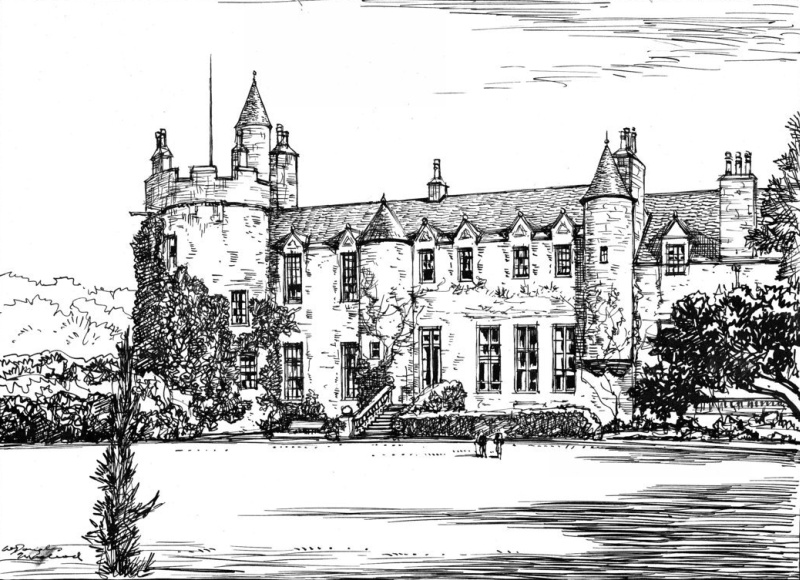
Craigcrook Castle.
During his first year in Edinburgh he came in contact with a
number of literary figures, including the poet Alexander Smith who was
secretary to the University, Professor John Blackie of the University,
John Buckle, historian, and Professor James Simpson, the discoverer of
the anaesthetic properties of chloroform. Simpson also advised
treatment for Massey's wife, without charge. But it was William
Stirling, MP for Perth, referred to as ‘That princely Stirling of Keir’
who befriended Massey with a generosity that was typical of his
practical and sympathetic personality. Stirling owned Craigcrook
Castle, at Keir, some three miles from Edinburgh. Dating from the
14th century and enlarged in the early 1800s, it was originally a large
manor house with a round tower and extensive grounds.[49]
Stirling willingly placed the castle grounds at the family's disposal.
But now Massey was feeling trapped by his job which he found to be
mentally exhausting as well as taking up more of his time than he had
anticipated. Hopes of financial security ended when he was forced
to employ a resident housekeeper to look after Rosina and the children
when he was at work, and he found himself getting poorer by the month.
To give Rosina a change of surroundings he arranged for a short holiday
at the Bridge of Allan, but even this had to be curtailed due to the
illness of one of his children. To add to his problems Rosina was
well into another pregnancy, complaining that she found Edinburgh too
cold and wanted to return south. All those factors so restricted
his time that he could undertake only a small amount of extra writing.
His next book of poems, Craigcrook
Castle, for which he over-optimistically expected to receive £200 if
it sold well, was consequently delayed. That extended venture into
blank verse included ‘The
Mother's Idol Broken’, an elegy on the death of Marian with a theme
similar to ‘Babe
Christabel’. However, Massey's depressing personal experience
increased his fault of excessive sentiment almost to the point of
morbidity which, by today's standards, makes the poem uncomfortable
reading:
|
…
She only caught three words of human speech:
One for her Mother, one for me, and one
She crowed with, for the fields, and open heaven.
That last she sighed with a sweet farewell pathos
A minute ere she left the house of life,
To come for kisses never any more …
Ere the soul loosed from its last ledge of life,
Her little face peered round with anxious eyes,
Then, seeing all the old faces, dropt content...
Within a mile of Edinburgh Town
We laid our little darling down;
Our first seed in God's acre sown! …
Today, when winds of winter blow,
And Nature sits in dream of snow,
With Ugolino-look of woe:
Wife from the window came to me,
Now leaves were fallen she could see
The little wee grave thro' shred elm-tree …
Think of our babe that will never wake,
And hold your own till fond hearts ache,
Sweet souls, for little Marian's sake … |
At that time the family was very fortunate in having made the
acquaintance of William Stirling, who generously loaned them money on
account to pay for the services of their housekeeper, and gave them
gifts of game from his estate.
Their next child, Sidney William Dobell, named after the
poet, was born on 7 May 1856 with a fate similar to Marian's, and some
four months later Dobell had again to write of bad news: ‘… Death
is again going up poor Massey's long stair, I fear; my little namesake
was nearly dying when I saw him last.’[50]
Little Sidney died of peritonitis on 10 September, placing another grave
in Warriston Cemetery and causing Rosina more mental trauma, especially
as the cemetery could be seen from the family's rooms.
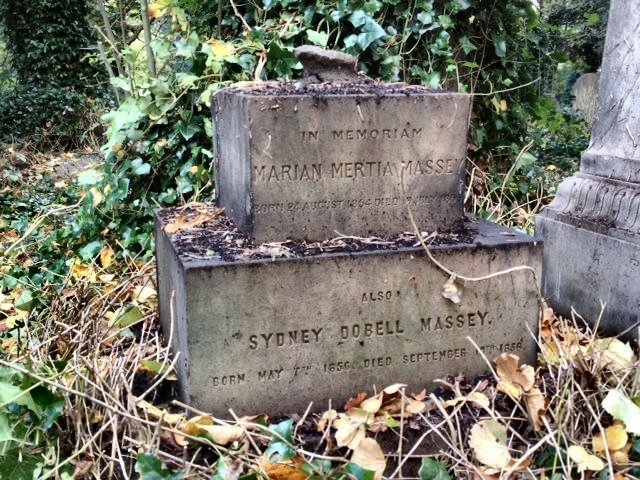
Warriston Cemetery (Ref. No 147, Section N, Sub-Section
N2, Inner Row 04).
Photos: Chris Halliday.
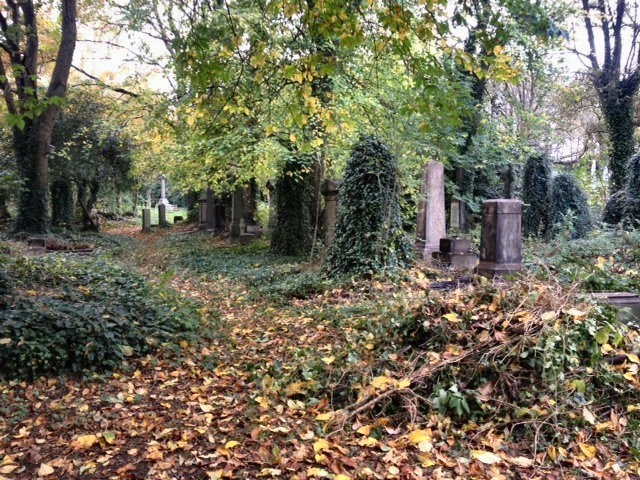
Some
additional unsigned writing was contracted for Hugh Miller's newspaper
the Witness, for which there is positive identification of a
series of eleven articles from May to September 1857, covering the
Manchester Art Treasures Exhibition.[51] Breaks
in the series were made in order to give more coverage to the Crimean
war. As an example of Massey's descriptive prose writing it is
among his best works, apart from his common fault of over extended
sentences. Yet even that has a subjective illustrative power in
its own right, reminiscent of, but antithetical to, Dickens' colourful
objective sketches. During the train journey to Manchester he
noted:
One whiff of Spring fragrance and we are whirled into Preston.
O, town of the multitude of tall chimneys, that reek continually in the
face of heaven! it is pleasant to behold thee receiving the nightly
baptism of God's cleansing air;—to see the arms of old grey space flung
around those lofty soot-fountains, and choking them, as it were, for a
short time, that have daily choked the air for so long;—to feel the hand
of silence laid on the perturbed spirit of machinery, while it lies like
a tired thing at rest. Gladly also do we again shoot out into the
country, away from those towering stacks and clanging mills that will be
all alive two hours hence, and clamouring at heaven, like so many
frustrated Babels, that all end in smoke; for we get the prettiest of
peeps of little nooks, where the lilac is all one mass of starry purple
bloom, and the fruit trees look like a winged shower of white. We
take in a good long breath of the sweet country air, as a diver does
before he makes his plunge, and, lo! we are in Manchester … [52]
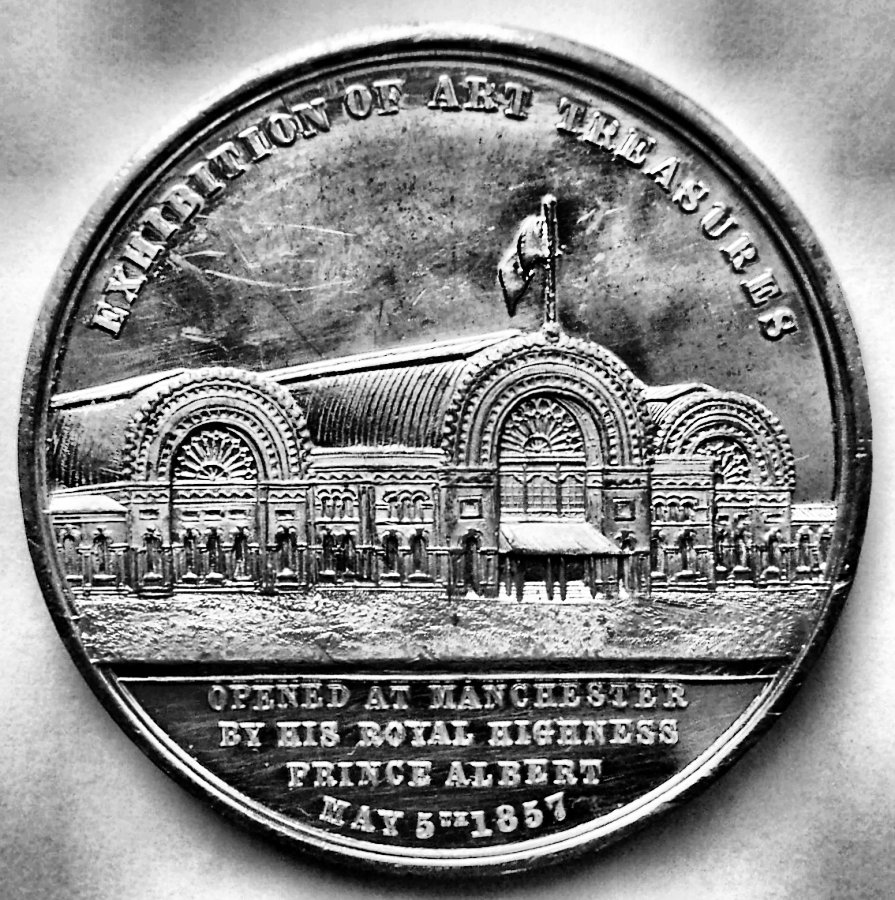
Medal
showing the front of the Manchester Art Treasures Exhibition Building.

The Nave of the Manchester Art Treasures Exhibition
Building
(Illustrated Times, 11 June 1857).
The large exhibition provided a sampling of all aspects of
art, with paintings particularly well represented, hanging in long
galleries. Most of Massey's articles were descriptions of these
works, and he wrote colourful vignettes of the painters, and stories of
the subjects that would have supplemented the published brochures to
advantage:
Shapes of grace have started from their marble immurement at the
sculptor's wakening touch, and taken their stand on pedestals by the way
… rich tapestries and fairy traceries … fruit dishes, starred and bossed
with jewels of price … common wood, carved with such art, you might
fancy it budded into life in that shape, and put forth those tendrils
and leaves that are only waiting for the juices of spring to flow …[53]
In spite of his dislike of newspaper work, it had developed
his prose writing away from the reflected, often excessively emotional,
subjectivism that remained a feature in his verse. There was
greater control and refinement of composition, with increasing critical
discernment. Without that experience, favourable literary
appreciation for his main prose works soon to follow would have been
considerably weakened.
|
